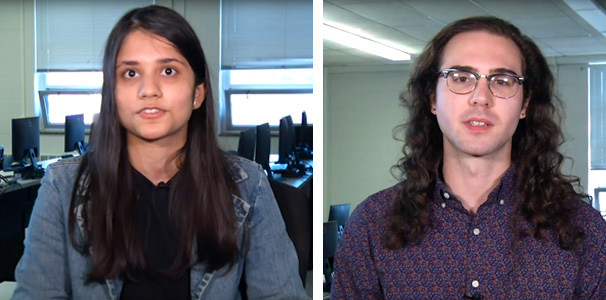College of Business and Technology
Computer Science students research machine learning

Suhana Ambol, a junior from Madhya Pradesh, India, who is double majoring in computer science and mathematics, began her research as a freshman through MSU's Undergraduate Research Fellowship Program. Along with her faculty mentor, Professor of Computer Science Dr. Sherif Rashad, Ambol has been researching continuous authentication of smartphone users using machine learning using a dataset of smartphone users' behaviors. Rashad and Ambol applied various supervised machine learning classifiers to authenticate users based on their smartphone activities. They are currently working on research to detect malware on smartphones using neural networks. Ambol presented her work at the Institute of Electrical and Electronics Engineers (IEEE) annual conference, which was held virtually.
Ambol said the work she's doing with Rashad interests her because of its usefulness and how it can be applied to help people.
"It always amazes me how the evolution of technology has provided immense opportunities to society," she said. "As an instance, artificial intelligence is widely used in the commercial sector providing personalized recommendations to online users based on their previous product search or online behavior.
Ambol also works under the mentorship of Dr. Heba Elgazzar, assistant professor of computer science. She said working with Elgazzar and Rashad has been a rewarding learning experience.
"Dr. Rashad is an incredible mentor. He has been a great motivation and guidance. I have learned a lot working under him. In my freshman year, all these topics were very new to me, but Dr. Rashad made sure that I understood the concepts well and move ahead in the right direction," Ambol said. "Dr. Elgazzar is our faculty advisor for Association of Computing Machinery (ACM) and it's a great experience to work under her guidance and learn from her. Both of them are always eager to help the students and dedicated towards their success."
Senior general computer science major Kyle Spurlock from Ashland has also been conducting undergraduate research with Elgazzar and presented his work at the IEEE conference. He and Elgazzar use unsupervised machine learning techniques to find inferences about data that previously shows no obvious classification or correlation. They are using clustering, defined as grouping similar samples to detect communities, and centrality, which is used to find the most interconnected or most important individuals within a population to analyze the data. Spurlock said the idea was to highlight potential connections between what is said on social media and use it as a supplementary health surveillance system for COVID-19.
"Current health surveillance techniques are very poor in terms of overall ability to accurately report on disease presence, and this is especially true of countries with poor health infrastructure," Spurlock said. "While the COVID-19 focused element of the research was mostly just a sign of the times, it is interesting to see what progress can be made in various subjects just by applying algorithms to a different context."
Like Ambol, Spurlock said the support he's received from his professors has pushed him to reach his full potential.
"The support and attention of the professors in my program has been what has made MSU for me. I am very grateful to them for all they have done for me and been able to share with me, of which I feel has definitely given me a better understanding and appreciation for my study."
To learn more about computer science programs at MSU, visit www.moreheadstate.edu/secs, email secs@moreheadstate.edu or call 606-783-2418.
Learn more about the program by watching this video: https://bit.ly/3dE6aCV
